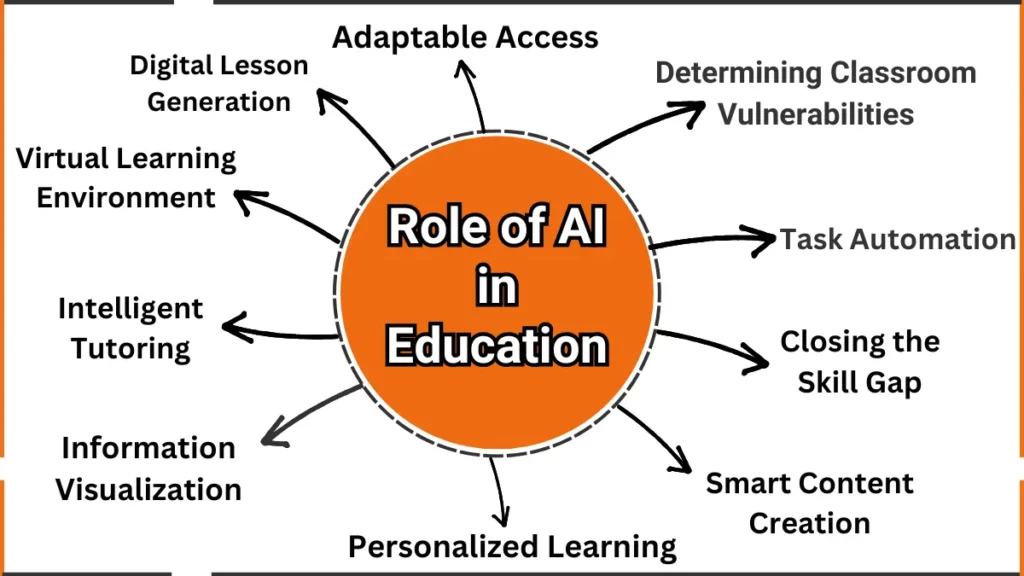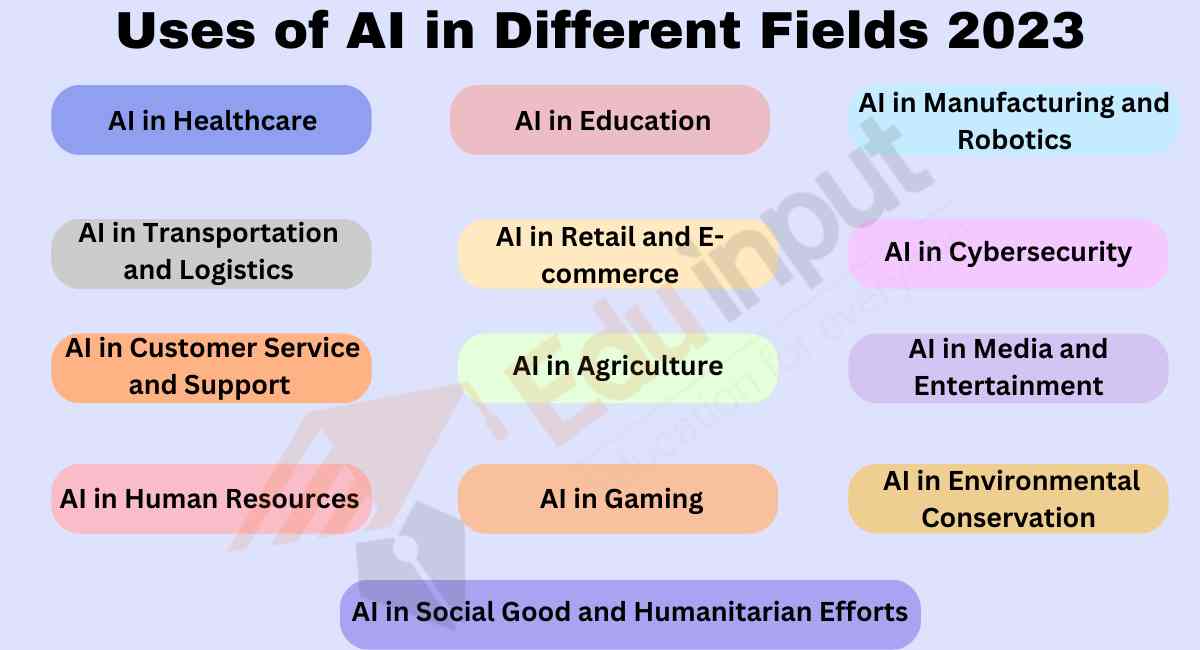Role of AI in Education
Artificial Intelligence (AI) has become an important tool that has changed many parts of our lives, including education. AI is capable of analyzing a lot of information and performing complex tasks.
It has changed the way of teaching and learning. AI helps us create personalized learning experiences and smart tutoring systems. This technology has a lot of potential and can improve education by creating an efficient, adaptable, and inclusive learning environment for everyone.

Uses of AI in Education
Different uses of AI are given below:
Personalized Learning
One of the most significant benefits of AI in education is its ability to personalize learning experiences. AI algorithms can analyze vast amounts of student data, including their learning preferences, strengths, and weaknesses, to create customized learning paths.
AI-powered systems enable educators to provide targeted support by tailoring content and instructional strategies to individual students’ needs, fostering better comprehension and engagement.
Task Automation
Administrative tasks can be time-consuming and divert educators’ attention from teaching. AI streamlines these processes by automating routine tasks such as grading, scheduling, and record-keeping.
By freeing up valuable time, teachers can focus on student interaction and instructional design, leading to more efficient and effective teaching practices.
Determining Classroom Vulnerabilities
AI analytics can help identify vulnerabilities within the classroom environment, providing valuable insights for educators. By analyzing data on student performance, engagement, and behaviour, AI systems can detect patterns and indicators of potential challenges. This information equips teachers with the knowledge to address specific issues promptly and implement targeted interventions to support struggling students.
Closing the Skill Gap
AI-powered tools facilitate personalized learning pathways, allowing students to learn at their own pace and fill knowledge gaps. Adaptive learning platforms utilize AI algorithms to identify areas where students are struggling and provide targeted remediation.
By offering personalized feedback and additional resources, AI enhances student learning and helps close the skill gap by effectively addressing individual needs.
Smart Content Creation
AI algorithms can generate educational content, including quizzes, worksheets, and lesson plans. These AI-generated resources can save educators significant time and effort, allowing them to concentrate on refining teaching strategies and adapting to individual student needs.
Moreover, AI-powered content creation tools can leverage adaptive learning techniques, ensuring that instructional materials are dynamic and responsive to students’ progress.
Information Visualization
Complex concepts can often be challenging to understand solely through traditional textbooks and lectures. AI technologies can transform educational content into visually appealing and interactive formats, making it easier for students to grasp abstract ideas.
Through infographics, simulations, and augmented reality (AR) applications, AI-enhanced information visualization offers students immersive learning experiences that promote deeper understanding and retention.
Intelligent Tutoring
AI-powered tutoring systems can provide personalized support to students preparing for examinations. These systems can adapt to individual learning styles, offering targeted resources, practice questions, and study plans, ensuring students are adequately prepared.
Virtual Learning Environment
AI can enhance the virtual learning environment during examinations by monitoring student activity and detecting potential academic integrity violations. By analyzing data and patterns, AI systems can flag suspicious behaviour, promoting fairness and maintaining the integrity of the examination process.
Digital Lesson Generation
AI algorithms can analyze vast amounts of educational resources, such as textbooks, scholarly articles, and online materials, to generate comprehensive and up-to-date lesson plans.
This feature empowers educators with a wealth of curated content, enabling them to design engaging and relevant lessons that align with current knowledge and research.
Frequent Content Updates
The field of education is constantly evolving, with discoveries and advancements occurring regularly. AI-powered systems can monitor and analyze emerging research, ensuring that educational content remains current and accurate.
By incorporating the latest information, educators can provide students with up-to-date knowledge, preparing them for the challenges of the modern world.
Adaptable Access
AI technology enables educational platforms to adapt to students’ diverse needs and learning styles. By leveraging machine learning algorithms, AI systems can offer content in various formats, such as text, audio, or video, accommodating different preferences.
This adaptability ensures that students with visual impairments, learning disabilities, or language barriers can access educational materials with ease, promoting inclusivity and equal opportunities for all.
Customized Data-Based Feedback
AI algorithms can analyze student performance data and provide detailed feedback on assignments, assessments, and projects. This personalized feedback helps students understand their strengths and weaknesses, guiding them toward improvement.
Moreover, AI can offer insights into students’ learning progress, enabling educators to tailor instruction and interventions accordingly.
Gamification
AI-powered gamification techniques can make examinations more engaging and enjoyable for students. By incorporating elements of competition, rewards, and progress tracking, AI-powered gamification enhances motivation and focus, leading to better performance.
FAQs
How does AI help students?
AI provides personalized learning by adapting lessons to a student’s pace and offering instant feedback to help them improve.
Is AI useful for remote learning?
AI supports remote learning by offering 24/7 access to lessons, quizzes, and interactive tools.
What is the biggest advantage of AI in education?
AI makes learning personalized, efficient, and accessible for students of all abilities.







Leave a Reply